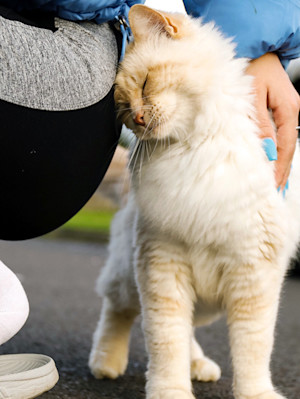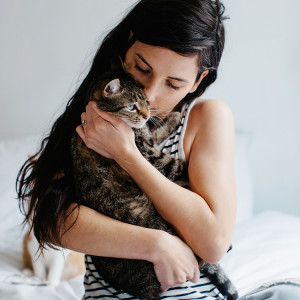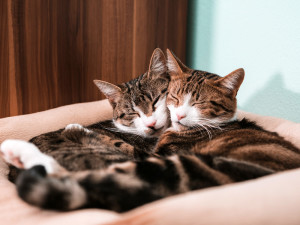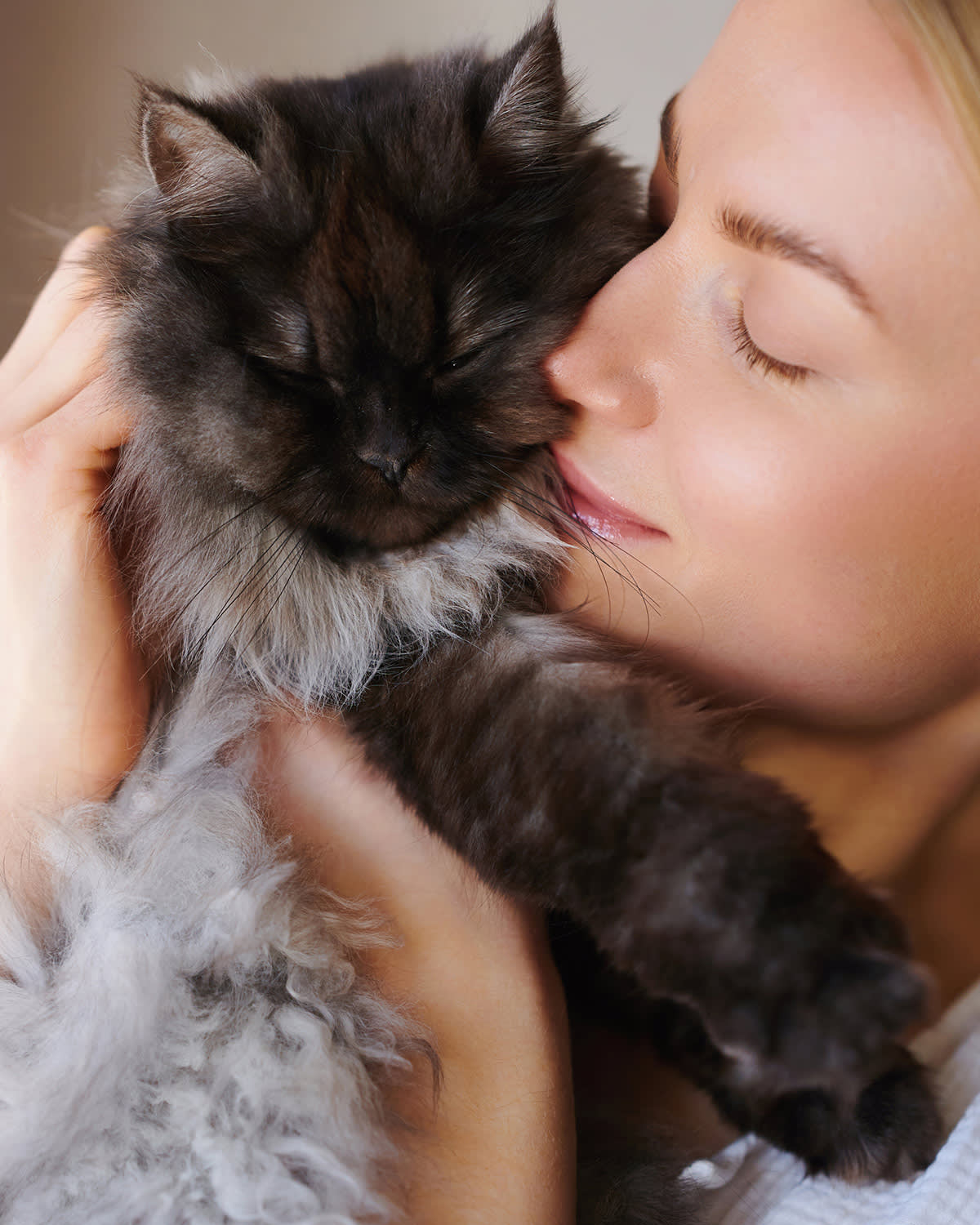
Share Article
Have you ever buried your face in your cat’s fur and wondered why they smell like freshly baked cookies, baby powder and a summer’s breeze all rolled into one? You’re not alone. Many cat parents find themselves drawn to their feline’s natural scent, often describing it as sweet, warm or simply comforting. Unlike dogs (sorry!), cats seem to maintain an almost magical ability to smell good naturally.
This phenomenon isn’t just your imagination – there are genuine scientific reasons why your cat smells so appealing, from their meticulous grooming habits to the chemistry of their saliva.
Why do cats smell so good?
The secret behind your cat’s pleasant aroma lies in their natural behaviour and biology. “Cats are naturally clean animals, and their fur often carries a soft, comforting scent due to their constant grooming,” explains Axel Lagercrantz, cat behaviourist and CEO of Pets4Homesopens in new tab. “Their saliva contains compounds that break down bacteria and help maintain a neutral or even sweet-smelling coat.”
This natural cleanliness sets cats apart from many other pets. Most cats spend 30-50 percent of their waking hours grooming themselvesopens in new tab, actively working to maintain their hygiene throughout the day.
How natural grooming habits help cats smell good
“Grooming helps keep their coats clean, allows them to remove any critters or parasites, and acts as a way of self-soothing,” says Joey Lusvardi, certified cat behaviour consultant at Class Act Catsopens in new tab. “Cat saliva contains antibacterial chemicals that help prevent odour-causing bacteria from growing, keeping them from becoming too smelly.”
Veterinarian Jess Simmonds from Animedopens in new tab adds: “Cats are prolific groomers. Their rough tongues help to remove dirt and distribute natural oils and scents, which keeps their coat healthy and fresh.”
Role of health and hygiene for a good-smelling cat
A cat’s overall health directly impacts how they smell. “Any change in your cat’s smell alongside other symptoms could point to a medical issue,” warns Simmonds. “For example, sweet-smelling urine can be a sign of diabetes. Strong urine smells from entire male cats may mean it's time to speak to your vet about neutering.”
Health problems such as dental disease, skin infections or kidney disease can all affect your cat’s natural scent.
Diet and nutrition
What your cat eats plays a significant role in how they smell. “A scent-free diet – meaning one without strong artificial flavours, preservatives or strong-smelling ingredients – can help keep a cat’s overall scent mild and more agreeable,” explains Lagercrantz.
Simmonds notes: “A cat’s diet can certainly change how their poo smells, and this may affect how their fur or skin smells if they groom themselves a lot after using the litter tray.”
Cat’s saliva
The antibacterial properties of cat saliva mean that every time your cat grooms, they’re applying a natural antibacterial solution to their fur. These compounds work continuously to break down bacteria that could cause unpleasant odours.
Environmental influences
Clean home environment
“A cat’s smell can be influenced by their environment so a cat living in a clean, fresh smelling home will be more likely to smell clean and fresh as well,” notes Simmonds.
“Low-stress, scent-rich environments – like sleeping on their owner’s clothes or a cosy blanket – can influence how a cat smells,” adds Lagercrantz. “Some of what we’re picking up might be subtle traces of those familiar home scents.”
Type of bedding
The materials your cat sleeps on can transfer subtle scents to their fur. Clean bedding made from natural fibres tends to contribute positively to your cat’s scent.
Types of toys
Well-loved fabric toys can play a role in scent transfer, particularly if they’re made from absorbent materials that hold pleasant household fragrances.
Types of litter
Maintaining proper litter box hygiene affects post-litter grooming behaviour, reducing the likelihood of unpleasant odours transferring to your cat’s body.
Human perception of your cat’s smell
The way we perceive our cat’s scent involves fascinating psychological elements. “People often describe the smell of cats’ paws as being like corn so they may just enjoy that scent,” Lusvardi observes. “In many cases, it’s a learned association – we link their scent to the purrs, their softness and the emotional connection we have with them.”
Lagercrantz adds: “The way a cat smells can trigger positive feelings in their humans, just like the smell of a baby can be calming and special to parents.”
Cat pheromones and cat smell
Cat pheromones play a vital role in feline communication. “Scent is extremely important to cats. It’s why you see them rubbing against walls or your legs – they’re marking familiar territory,” says Joey Lusvardi.
“Cats use smell to identify individuals and to feel safe and connected. When a cat rubs against you or leaves scent marks, it’s a way of saying ‘you belong with me’,” explains Axel Lagercrantz. “Their keen sense of smellopens in new tab helps them recognise familiar people and places, strengthening the bond between cat and human over time.”
This scent marking behaviour helps explain why your cat’s smell becomes so comforting over time.
The bottom line: why your cat smells so good
The pleasant scent of your cat results from a combination of natural grooming, healthy biology, environmental factors and your emotional connection to them. “While a nice-smelling cat is often a healthy one, any strong or unusual odour should be checked out by a vet,” advises Lagercrantz.
Your cat’s grooming instincts, combined with antibacterial saliva and their clean environment, create that distinctive, comforting scent that cat parents cherish.
Frequently asked questions
Why do I love the smell of my cat?
“It’s similar to people developing a fondness for smells that remind them of pleasant memories,” explains Lusvardi. “Our emotional connection to our cats influences how we perceive their scent.”
Why do cats always smell good?
“Cats are prolific groomers so their natural grooming behaviour helps to keep them clean and distribute oils and scents across their bodies,” says Simmonds.
Why does my cat’s fur smell sweet?
Cats often carry a soft, comforting scent due to their saliva’s bacteria-fighting compounds and the even distribution of natural oils through grooming. “You often get that gentle ‘baked’ or ‘sun-warmed’ smell cat parents adore,” explains Lagercrantz. The sweet scent may also reflect traces of their home environment or bedding, adding to that distinctive feline fragrance.
Resources
Cornell University College of Veterinary Medicine. (2017). Cats that Lick Too Muchopens in new tab. [online]
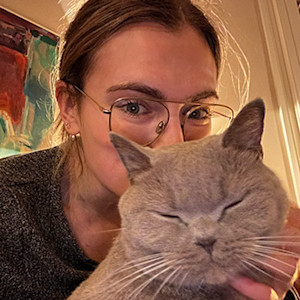
Natalie Gil
Natalie Gil is a freelance journalist who has written for iNews, the Irish Independent, Stylist and more. She previously worked at Refinery29, Monzo and the Guardian, and is the proud cat mum of British Shorthairs Prune and Oat.
Related articles
![a picture of a white fluffy cat rubbing their head against a human leg]()
Headbutts & Boops: Why Your Cat Is Bunting You
It’s (yet another) adorable behaviour your cat does, but could it indicate something more serious?
![dark-haired woman hugging cat that has imprinted on her]()
10 Signs Your Cat Has Imprinted On You
Feeling like you have a little shadow these days? A cat behaviourist explains why that’s happening
![Cat making a disgusted face.]()
7 Scents Your Cat Probably Can’t Stand – Plus, a Few They Love
Their noses are as powerful as they are cute
![Two tabby cats in embrace lying in cushion.]()
What Are Cat Pheromones and How Do They Work?
Communication is key, and pheromones are your cat’s version of DMs

